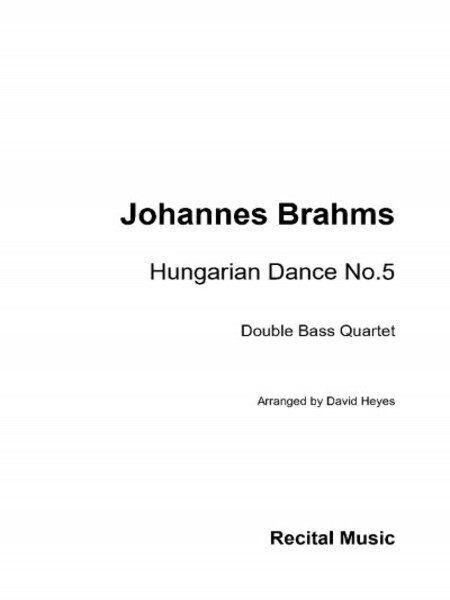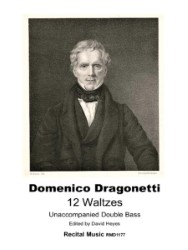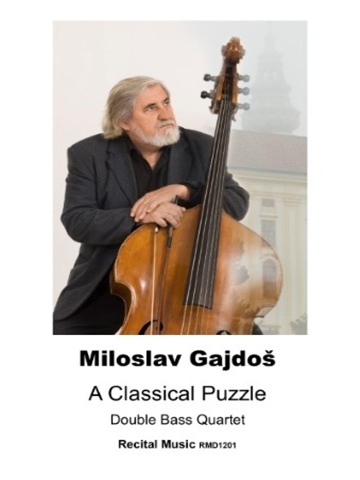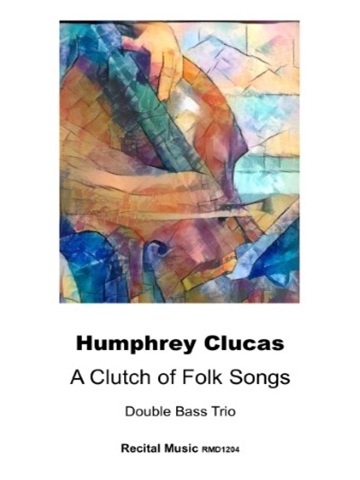Hungarian Dance No.5

Composer: Brahms, Johannes
Arranger: David Heyes
Instrumentation: 4 Double Basses
Publisher:
| Product Code: | RMD1122 |
| Publishers Number: | RMD1122 |
| Language: | English |
| Condition: | New |
Brahms’s music includes symphonies, concerti, chamber music, piano works, choral compositions, and over 200 songs. His style is deeply rooted in the structures and compositional techniques of the Classical masters, yet his music also embodies deeply Romantic motifs. While some contemporaries found his music to be overly academic, his craftsmanship was admired by later figures as diverse as Arnold Schoenberg and Edward Elgar.< His life began in a Lutheran family, and his father, Johann Jakob Brahms, was a musician who found work as a jobbing musician and a string and wind player in Hamburg. Johannes showed early promise as a pianist and first studied music with his father. At age seven, he was sent for piano lessons to F.W. Cossel, who three years later passed him to his own teacher, Eduard Marxsen. Between ages 14 and 16, Brahms helped support his family by playing in inns in the dock area of Hamburg, while also composing and sometimes giving recitals. In 1850, he met Eduard Reményi, a Jewish Hungarian violinist, with whom he gave concerts and from whom he learned something of Roma music—an influence that remained with him always. The turning point in his career came in 1853 when he met the violin virtuoso Joseph Joachim, who instantly recognized Brahms’s talent. Joachim introduced him to composer Robert Schumann, and this connection led to Brahms’s music being published and gaining recognition Brahms was a virtuoso pianist who premiered many of his own works. He worked with leading performers of his time, including the pianist Clara Schumann and the violinist Joseph Joachim, the latter being a close friend. His works have become staples of the modern concert repertoire, and his influence on music has been profound, with his detailed construction of works serving as a starting point and inspiration for a generation of composers.
Johannes Brahms (1833-1897) composed 21 Hungarian Dances for piano (four hands), published in two sets in 1869 and 1880, some of which he later arranged…
Hungarian Dance No.5, originally in F sharp minor but transposed into G minor for orchestra, is probably the most famous of the set and was quickly arranged for many instrumental ensembles including violin or cello and piano, string orchestra, brass quintet, recorder quartet, wind band, and even 15 saxophones, percussion and piano.
This new arrangement for Double Bass, Quartet was created by David Heyes for his students at Wells Cathedral in Somerset. In the key of G minor, the music suits the bass quartet medium well with effective musical and technical challenges for each player. Basses 1 and 2 share most of the melodic material and this is a fun piece that would be ideal as an encore or the final work in a recital.
Hungarian Dance No.5 is aimed at the intermediate-advanced quartet and is a sure- fire hit with players and audiences alike.
R.R.P £6.50
Our Price: 5.2
Digital Download – PDF
Shipping costs: No shipping
You might also like
-
12 Waltzes for Double Bass
£6.80 -
6 Christmas Carols
£10.00 -
A Classical Puzzle
£6.80 -
A Clutch of Folk Songs
£6.00




